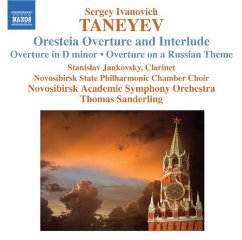Sergei Taneyev - Orchestral Works: Oresteia Overture etc. (2009)
Sergei Taneyev - Orchestral Works: Oresteia Overture etc. (2009)

1 Overture To Oresteya, Op. 6 20:48 2 Oresteya, Act III: Entr'acte: The Temple Of Apollo At Delphi 5:10 3 Adagio In C Major 5:54 4 Overture On A Russian Theme 17:26 5 Cantata For The Unveiling Of The Moscow Pushkin Memorial, "Ya Pamyatnik Sebe Vozdvig Nerukotvorniy" (I Have Built Myself A Monument Not Made By Hands) 4:26 6 Canzona 6:21 7 Overture In D Minor 14:48 Stanislav Jankovsky - clarinet (6) Novosibirsk State Philharmonic Choir (5) Novosibirsk Academic Symphony Orchestra Thomas Sanderling - conductor
‘The Temple of Apollo at Delphi’ is the best-known excerpt from Taneyev’s only opera, Oresteia, the mammoth overture to which has all the force of a Romantic symphonic poem.
His Overture on a Russian Theme is based on the same folksong that Rimsky-Korsakov used in his own Fantasy on Russian Themes while the shorter works demonstrate in various ways Taneyev’s scrupulous craftsmanship.
Thomas Sanderling and the Novosibirsk Academic Symphony Orchestra’s acclaimed recording of Taneyev’s Symphonies Nos. 1 and 3 is available on Naxos 8570336. ---prestomusic.com
Unfamiliar scores played with great conviction. A real treat.
Taneyev may not be high on most people's list of 19th-century Russian composers but that could change as this Naxos series progresses. The First and Third symphonies with the Novosibirsk orchestra under Thomas Sanderling - son of the illustrious Kurt - certainly impressed me and, if anything, this new release has heightened my admiration for composer and orchestra alike.
Taneyev's only opera, based on Aeschylus's Oresteia, was recorded by DG and Olympia some time ago, but neither version is in the current catalogue. Curiously, the overture was composed and performed several years before the opera was completed. It's a substantial piece in its own right, lasting around 20 minutes, and listeners may be forgiven for thinking they've stumbled on a little-known piece of Wagner or Richard Strauss. That said, this is more than musical mimicry, revealing a rich supply of motile Russian melodies and a symphonic sweep that wouldn't have disgraced Taneyev's great friend and mentor, Tchaikovsky. From that first Stygian string theme through to its restrained finale this overture is full of lovely touches; and even though there is a whiff of Scriabin in those aromatic harmonies Sanderling ensures they never cloy or overwhelm the senses.
Arguably the Act III Entr'acte is even more seductive - it certainly has a Straussian amplitude - which is probably why this piece was so popular during the composer's lifetime. I was particularly struck by the sheer passion and unanimity of the playing and Sanderling's firm, clear-eyed view of the score. The recording is just as satisfying, deep when it needs to be and suitably grand in the splendid climaxes. Indeed, any misgivings I might have had about this band and their conductor simply evaporated at this point.
How very different that all is to the delectable Adagio in C major, written during the composer's final year at the Moscow Conservatory. As Anastasia Belina points out in her liner notes, much of Taneyev's youthful work was only discovered years later. The Adagio, published in 1950, is a real gem, especially when it's played with such elegance and refinement. And how different again is the Overture on a Russian Theme, written for the All-Russian Art and Trade Exhibition of 1882. Taneyev makes use of authentic Russian songs - as collected by Rimsky-Korsakov - forging them into a piece that has all the cut and thrust of a Cossack sword. It's virile stuff, guaranteed to please those who like their Russians to strut and swagger.
The style of the cantata, written for the opening of the Pushkin Memorial in Moscow, is echoed in the celebratory music of post-revolutionary Russia, used to great effect by the likes of Prokofiev and Shostakovich. That's not to suggest this is merely a patriotic prole-pleaser, because it isn't; it may be just 64 bars long but it has all the passion and splendour of those great choral numbers in Alexander Nevsky. As for the Canzona it's a frothy little confection, complemented by the bright-toned playing of clarinettist Stanislav Yankovsky. A slight piece, perhaps, but enjoyable none the less.
The Overture in D minor, like the Adagio, is an early work and this time it shows. It has a bluff quality - and a tendency to outstay its welcome - that the other pieces in this collection manage to avoid. (I wonder if other listeners can hear Brahms in this music?) Still, one mildly disappointing piece out of seven isn't bad, and it certainly isn't enough to dilute my enthusiasm for this disc as a whole. Factor in committed playing and full-blooded sound and you have one of the year's most entertaining releases so far.
Go on, treat yourself. --- Dan Morgan, MusicWeb International
download (mp3 @320 kbs):
yandex mediafire ulozto gett bayfiles








